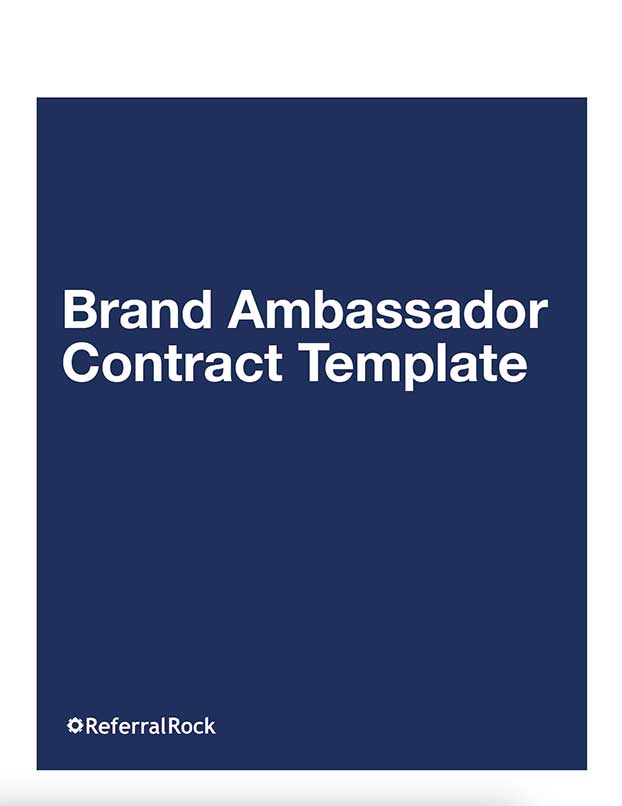Download the free brand ambassador contract template
We’ve compiled all the essentials you need to create a brand ambassador contract — this will help you set clear expectations with ambassadors and protect your brand!
Use our free brand ambassador agreement template. Refer to the sections below for more details, and fill it in to create a contract based on your individual program’s needs.
Download now >
What is a brand ambassador contract?
A brand ambassador contract is a legally binding, written agreement that outlines the relationship between your brand and its ambassadors. It covers the expectations, responsibilities, and legal terms of the relationship. New brand ambassadors must read and sign this agreement before starting to represent you.
The contract will usually include:
- The scope of your ambassador’s role
- Responsibilities of both your brand and the ambassador
- Compensation details
- Rules for the use and portrayal of your brand
- Termination procedures (what happens if one party wants to end the relationship)
Since every brand ambassador relationship is unique, you’ll create a separate contract for each ambassador you recruit. But you can use similar terms and sections in each.
What should a brand ambassador contract include?
What sections to include in your contract? These essential terms correspond with our downloadable template above:
- Definitions
- Contact details
- Overview of your brand
- Relationship between your brand and the ambassador
- Expectations and responsibilities
- Branding and promotional guidelines
- Compensation terms
- Exclusivity clause
- Non-disclosure and confidentiality
- Tracking
- Copyright terms
- Cancellation
- Termination
- Other legal terms
- Signatures
Keep in mind that these are just the vital parts of a brand ambassador contract – this isn’t an exhaustive list. You can add other sections and provisions based on what works best for your brand.
Free Download: Get started with our brand ambassador contract template!
1. Definitions
To ensure every party bound by the contract is inclined towards a common goal, be sure to define terms such as “ambassador/brand ambassador,” “brand ambassador contract,” or “brand ambassador agreement.”
This helps keep everyone on the same page, and cuts through the legalese of the document for a smooth flow of events.
2. Contact details
Who is this agreement between? (List your brand’s name and the ambassador name).
List your ideal contact information in case the ambassador wants to get in touch with you about the relationship. It’s also helpful to include your company website and social handles, so the ambassador knows your assets and can research you as needed.
When it comes to the ambassador, include their name, email address, and phone number. If it’s applicable to the ambassador’s duties, include their social media handles as well.
Plus, if they have an agent or manager who takes care of their business-related matters (sometimes the case with niche experts or social media influencers with high follower counts), include that information under their own contact details.
3. Overview of your brand
What does your company sell and do? What are your essential values and guiding mission? Anything else relevant that the ambassador needs to know, like your size, location, and revenue? This section should be brief yet informative enough, so new ambassadors know exactly what kind of business they’re dealing with before proceeding further into the entire contract document.
4. Relationship between your brand and the ambassador
Establish the ambassador’s position as a representative of your company, and what they bring to the table as a creator and/or authority. Is the ambassador an employee, or do they remain a third party, independent from your brand? You don’t want any confusion about what kind of relationship you have with each other, so make sure it’s clear right off the bat.
5. Expectations and responsibilities
What are the responsibilities of the brand ambassador? Will they primarily promote your brand online, or will they represent you at offline events as well? In detail, describe the online and offline promotional efforts they will engage in. For example, they might create social media posts or blog posts, represent you at trade shows and events, or create their own events or guerrilla promotions for you.
If they’ll create social media posts, be specific about the social media channels they’ll use (e.g. Instagram or TikTok).
Also, outline the goals that the ambassador will help you accomplish.
- For instance, will they increase brand awareness?
- Promote particular company products or services?
- Generate leads through relationship-building and interaction with customers, whether that takes place on social media platforms, offline, or both?
If you want them to create a given amount of content for you, how much must they create? What’s the timeline for the release of each content piece? Or, how regularly do they need to create content featuring your brand?
Finally, what is your brand providing the ambassador, so they can accomplish the provisions of this agreement? Whether that’s free products or services needed to best promote you, access to corporate events such as trade shows, branded items such as business logo apparel, or other collateral materials used in connection with their work, outline all that you’ll supply here.
6. Branding and promotional guidelines
Ambassadors should have the freedom to promote your brand in their authentic voice, but you’ll still need to codify brand standards so they represent you properly. Cover all the essential branding standards, including the following:
- What are the most important selling points and values that your brand represents?
- What key messaging should they cover when sharing your product?
- What rules must they follow when using your brand names?
- What words or phrases must they not associate with your brand?
- What logos, slogans, products, and names are the trademarked property of your company – assets they can’t use without your explicit permission?
You’ll also need to cover guidelines for promoting you online, if that’s part of their ambassadorship. For instance, what are the rules for the images they create?
- Must they feature the ambassador authentically using the product in their daily life, instead of just the product?
- Must they be clear and not blurry?
- Must they be created without the use of filters?
7. Compensation terms
Cover all the payment terms in this section. First off, how will brand ambassadors be paid, and how much will they earn? Will they be paid in cash, free products, credits towards future purchases from you, or tangible gifts unrelated to your brand? Although many ambassadors are intrinsically motivated to further your brand, and willing to work for no payment at all, compensation formalizes your agreement and properly recognizes ambassadors’ time and efforts.
When will brand ambassadors be paid? Be it on a regular cadence or after each deliverable or event is completed, state the payment schedule. Also, if applicable to your relationship, what, specifically, must brand ambassadors accomplish before they’re paid? For example, will they be paid when they bring in qualified leads or make sales?
Finish the section with compensation disclosure terms, to cover the legal aspect of publicly promoting a brand for a fee. How must brand ambassadors disclose that they’ve been paid to promote you, to comply with FTC disclosure requirements or other applicable laws?
8. Exclusivity clause
The exclusivity clause prevents the ambassador from engaging in any other activity that could conflict with your brand. This is an agreement that your ambassador makes to not work for or represent any of your direct competitors, either through paid or unpaid activities.
Your brand should have the right to control the ambassador’s activities to ensure that their promotion of you is authentic, which includes ensuring they do not engage in other activities that would negatively impact their relationship with your brand.
For instance, if your company wants to prohibit ambassadors from mentioning competitors, or from publicly saying anything that might imply an endorsement of some product outside your own product line (which could be viewed as false advertising), then these terms would need to be included in the contract.
9. Non-disclosure and confidentiality
Non-disclosure and confidentiality clauses are important in any contract—they protect you and your business. This section of the contract outlines if there’s any confidential information that you and the ambassador share with each other (which isn’t available to the public). The contract outlines that both parties agree not to disclose this information to parties outside of their relationship.
10. Tracking
Tracking is the process of measuring the performance of your brand ambassador. Brand ambassadors will want to know if and how you will track their performance, especially if that’s directly tied to rewards. For instance, if you’re using brand ambassador software to distribute trackable links to ambassadors and log the sales your ambassadors help you make, describe the details of that tracking in your contract.
11. Copyright terms
Copyright concerns, like intellectual property rights, will depend on the terms of your brand ambassador contract. In most cases, brands need to protect their image and ensure that their ambassadors promote only the brand they’ve agreed upon in their contracts. As such, you may include a clause in which you state that any images or videos created for your brand by an ambassador during their tenure become the property of the company; hence, you have full ownership rights.
Customarily, though, in most brand ambassador contracts, the brand has full rights to use and repurpose content that the ambassador creates while they represent the brand, but the ambassador retains the overall copyright and ownership over the content.
If you want to give more control over these assets back to your ambassador at the end of the contract (or if you want an additional incentive for them), consider including language stating that all content rights revert to your ambassador once the contract comes to an end.
If the rights to the content fully return to the ambassador when the contract is ended, this means your brand can’t use content someone creates once they aren’t your ambassador anymore.
12. Cancellation
Ordinarily, brand ambassador contracts last until a brand or an ambassador decides to cancel them, but sometimes they expire at a set time. This section details that, if the brand ambassador cancels the contract, they must do so in writing – provided that they meet the stated reasons for cancellation.
In most cases, ambassadors will have to provide a cancellation notice within a certain number of days before the end of their contract. If the ambassador wants to end the formal relationship and cancel the contract, within how many days must they notify your brand? For instance, some contracts state that if an ambassador wants to end their formal relationship and cancel their contract, they must notify the brand in writing within 30 or 60 days after signing.
13. Termination clauses
In the event that an ambassador’s behavior has become problematic or unethical, this section details that the contract can be terminated immediately. For instance, if they’re making disparaging comments about your brand or their actions are potentially damaging to your brand image and reputation, an ambassador can be let go right away. Be sure to include all of the exact unethical or problematic ambassador behaviors that qualify for immediate termination of this agreement.
Remember, ambassadors are a walking reflection of your company brand, so any publicly known questionable behavior (even behaviors when they’re not directly representing you) that could reflect badly on your brand should be covered in this section.
In the case of immediate termination, it is imperative that you notify the ambassador in writing with a clear explanation as to why their employment contract has been terminated, as well as when and how they should return any unused products. It’s also advisable to include a list of guidelines for how and when they can work with other brands moving forward (this is called the separability clause).
14. Other legal terms
In addition to the above sections and the policies listed on your website, be aware that a number of state and national laws may apply to your ambassador’s activities. You should check with a lawyer in your state or country to verify the governing laws before entering into any brand ambassador agreement.
The following is a list of other legal terms that may be included in your brand ambassador contract:
- Indemnification clause: this protects either party from liability caused by the actions of the other and the damages that result thereafter.
- Any state and national laws that may apply to your ambassador’s activity.
- The legal procedure to apply if the agreement is breached.
- Arbitration: What happens if you need to settle a dispute outside of court.
- Judicial procedures: What happens if a dispute can’t be resolved with personal arbitration, and goes to court with a judge and jury. Usually, this section includes that each party pays their own case costs and attorney’s fees.
- Severability: This means other terms of the contract still apply even if one term can’t be legally enforced.
15. Signatures
Include space for you (or another representative of your business) and the brand ambassador to sign the agreement, to make the contract official and binding, and show your written consent to the terms of this agreement. Depending on the format, you could collect handwritten signatures, or ask for e-signatures with the brand ambassador’s name. Be sure to include the effective date (the date the contract is signed and becomes a binding agreement).
Once ambassadors have signed the contract, they’re ready for training, after which they can then start promoting your brand.
If you’re using Referral Rock, anyone who joins your ambassador program automatically agrees to its terms and conditions. No need to wait on ambassadors’ signatures; just send them the agreement or terms and conditions page, and give them a link to register for the program.
Bonus: Amendment clause
What if you think that you’ll need to make changes to the contract? Include an amendment clause. This clause details how changes can be made to the agreement, and mentions that both parties will need to agree to the changes.
Often, an ambassador will get notified via email of the proposed changes, and will have to provide another signature for the changes to take effect. But with software like Referral Rock, simply continuing to be part of the program means agreeing to the changed rules.
Why do you need a brand ambassador contract?
Now that you know the sections that a brand ambassador contract, let’s review why brand ambassador contracts are so vital. A brand ambassador contract is crucial in formalizing your brand ambassador program. It clearly communicates your expectations and requirements, ensuring that you and the ambassador are on the same page. And if there are any questions about the program, the contract stands as the source of authority.
The contract also codifies the relationship between you and the ambassador, which is especially vital if you aren’t hiring and paying them like a traditional employee. After all, an ambassador could be anyone who is passionate about your brand, such as a customer or niche expert who’s only now entering a more formal agreement with you.
In the contract, you establish whether ambassadors are independent contractors or employees, and what happens if they act questionably during their time as your brand ambassador.
Free Download: Make it easier with our brand ambassador contract template!
In addition, having a contract protects you legally, in case an ambassador does something clearly unethical. This includes any potential issues with a third party who claims they were wronged by one of your ambassadors. In that case, a written agreement makes sure everyone knows their legal rights in resolving such disputes out of court (which may be necessary).
Start your brand ambassador program
We hope this guide has given you everything you need to know about the ins and outs of brand ambassador contracts, and the inspiration to start your own program.
If you’re ready to get started, we can help! Check out how you can create a brand ambassador program with software — Referral Rock offers a variety of tools and features that are sure to make your brand’s life easier! Or browse 10 awesome brand ambassador program examples for inspiration.





